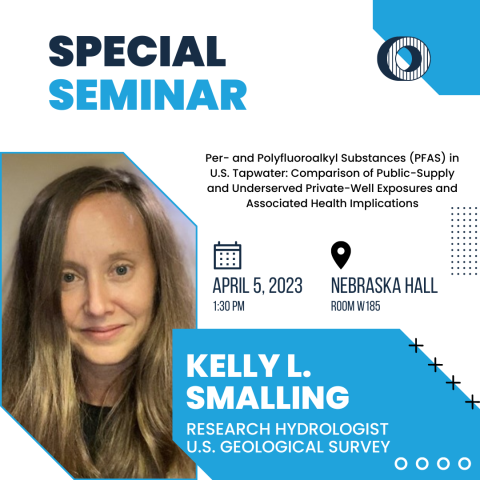Special Seminar
Per- and Polyfluoroalkyl Substances (PFAS) in U.S. Tapwater: Comparison of Public-Supply and Underserved Private-Well Exposures and Associated Health Implications
NOTE: Due to last minute events, Kelly will not be able to travel to Lincoln and will present virtually. You're welcome to view the special seminar in Nebraska Hall to watch Kelly's virtual presentation, or to join virtually via Zoom.
Kelly L. Smalling, Ph.D.
U.S. Geological Survey
ZOOM LINK: https://unl.zoom.us/j/95199163459
Wednesday, April 5, 2023 | 1:30 - 2:30 p.m. CT
Nebraska Hall, Room W185, Lincoln, Neb.
Biography:
Kelly Smalling is a Research Hydrologist with the U.S. Geological Survey, New Jersey Water Science Center. She is Co-lead, along with Paul Bradley of the USGS Environmental Health Program, Drinking-Water and Wastewater Infrastructure Integrated Science Team. Kelly’s research is focused on the actual versus perceived health risks of contaminant mixtures to human health and the environment (including fish and wildlife).
Abstract:
Drinking-water quality is an evolving concern in the United States, emphasizing the need to broadly assess exposures and potential health effects at the point-of-consumption. Drinking-water exposures to per- and poly-fluoroalkyl substances (PFAS) are a national concern, however, there is limited information on PFAS in residential tapwater, especially from private-wells. We conducted a national reconnaissance to compare human PFAS exposures in regulated public-supply and unregulated private-well tapwater. Concentrations of 32 target PFAS were assessed as fractional indicators of the presumptive 8000+ PFAS contaminant-space and compared with land-use and potential-source metrics to explore drivers of contamination. The presentation will provide a brief overview of U.S. Geological Survey, Environmental Health Program PFAS research with an emphasis on our national reconnaissance designed to assess human exposures and potential effects of PFAS nationally in tapwater collected at the point-of-use.

